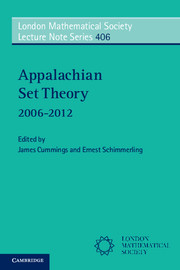Book contents
- Frontmatter
- Contents
- Contributors
- Introduction
- 1 An introduction to ℙmax forcing
- 2 Countable Borel equivalence relations
- 3 Set theory and operator algebras
- 4 A tutorial on Set Mapping Reflection
- 5 An introduction to hyperlinear and sofic groups
- 6 Aronszajn trees and the SCH
- 7 Iterated forcing and the Continuum Hypothesis
- 8 Short extender forcing
- 9 The complexity of classi?cation problems in ergodic theory
- 10 On the strengths and weaknesses of weak squares
- 11 Proper forcing remastered
- 12 Set theory and von Neumann algebras
- 13 The HOD Dichotomy
11 - Proper forcing remastered
Published online by Cambridge University Press: 05 December 2012
- Frontmatter
- Contents
- Contributors
- Introduction
- 1 An introduction to ℙmax forcing
- 2 Countable Borel equivalence relations
- 3 Set theory and operator algebras
- 4 A tutorial on Set Mapping Reflection
- 5 An introduction to hyperlinear and sofic groups
- 6 Aronszajn trees and the SCH
- 7 Iterated forcing and the Continuum Hypothesis
- 8 Short extender forcing
- 9 The complexity of classi?cation problems in ergodic theory
- 10 On the strengths and weaknesses of weak squares
- 11 Proper forcing remastered
- 12 Set theory and von Neumann algebras
- 13 The HOD Dichotomy
Summary
The fourteenth Appalachian Set Theory workshop was held at the University of Illinois in Chicago on October 15, 2011. The lecturer was Boban Veličković. As a graduate student Giorgio Venturi assisted in writing this chapter, which is based on the workshop lectures.
Abstract
We present the method introduced by Neeman of generalized side conditions with two types of models. We then discuss some applications: a variation of the Friedman-Mitchell poset for adding a club with finite conditions, the consistency of the existence of an ω2 increasing chain in, originally proved by Koszmider, and the existence of a thin very tall superatomic Boolean algebra, originally proved by Baumgartner-Shelah. We expect that the present method will have many more applications.
Introduction
We present a generalization of the method of model as side conditions. Generally speaking a poset that uses models as side conditions is a notion of forcing whose elements are pairs, consisting of a working part which is some partial information about the object we wish to add and a finite ϵ-chain of countable elementary substructures of H(θ), for some cardinal θ i.e. the structure consisting of sets whose transitive closure has cardinality less than θ. The models in the side condition are used to control the extension of the working part. This is crucial in showing some general property of the forcing such as properness.
The generalization we now present amounts to allowing also certain uncountable models in the side conditions.
Information
- Type
- Chapter
- Information
- Appalachian Set Theory2006–2012, pp. 331 - 362Publisher: Cambridge University PressPrint publication year: 2012
Accessibility standard: Unknown
Why this information is here
This section outlines the accessibility features of this content - including support for screen readers, full keyboard navigation and high-contrast display options. This may not be relevant for you.Accessibility Information
- 2
- Cited by
